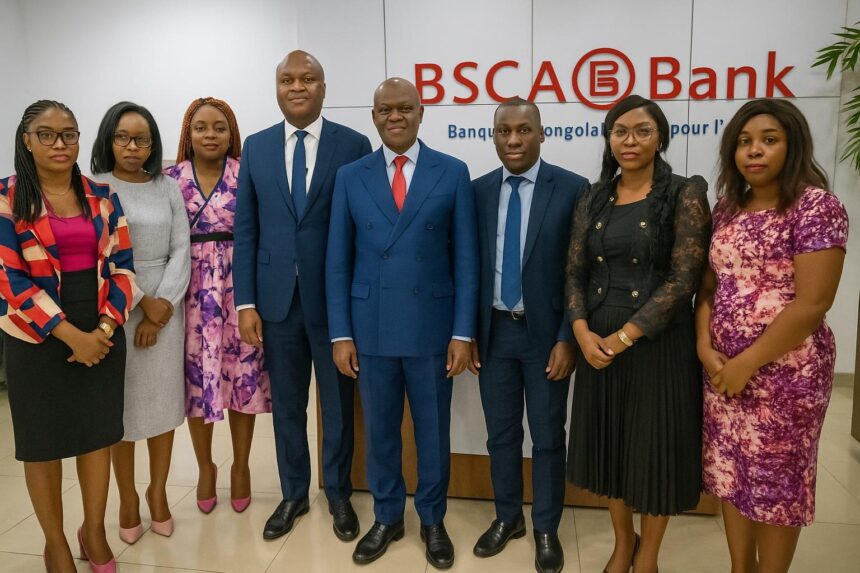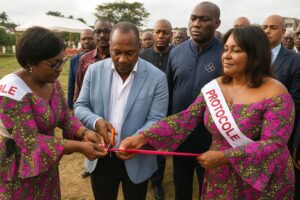Prime Minister highlights inclusive-growth agenda
Standing under the tropical morning sun, Prime Minister Anatole Collinet Makosso inspected the glass façade of BSCA Bank’s Côte Sauvage branch on 26 August. His choice to inaugurate the first oceanfront banking facility in Congo-Brazzaville illustrated how closely the executive links everyday finance to the country’s wider development vision.
Government communiqués emphasised that the stop formed part of a broader tour of strategic infrastructures in Pointe-Noire, the commercial capital. Officials framed the visit as evidence of policy continuity within the 2022-2026 National Development Plan, whose pillars include digitalisation, job creation and social cohesion (Prime Minister’s Office statement).
Seaside branch deepens financial access
With a 24-hour self-service lobby and biometric ATMs, the agency expands banking access for port workers, oil-sector employees and fishing cooperatives often constrained by standard branch hours. According to the bank’s management, roughly 45 percent of its new accounts in Pointe-Noire over the past year were first-time entrants to formal finance.
The coastal location also answers the demographic shift southwards as Pointe-Noire’s suburbs merge with beach communities. By pairing mobile-money kiosks with traditional counters, BSCA Bank seeks to bridge the formal-informal divide that still characterises almost half of Congo’s economic activity, Central Bank estimates show.
Ten years of Sino-Congolese partnership
Founded in July 2015, BSCA Bank is a joint venture between the Republic of Congo and China’s State Development Bank. Its authorised capital of 50 billion FCFA positions it among the top five lenders nationwide, and it operates branches in Brazzaville, Oyo and now two locations in Pointe-Noire.
Chief Executive François Boussola told reporters that the bank’s deposit base grew by double digits annually during its first decade, mirroring bilateral trade expansion between Brazzaville and Beijing. “Our shareholder mix equips us to finance projects from rural irrigation to telecom towers,” he noted during the visit (local press pool).
Regulatory reforms nurture investor confidence
Analysts attribute BSCA Bank’s momentum to reforms enacted since 2018, which streamlined licensing and strengthened prudential ratios under the Central African Banking Commission. These measures helped Congo’s banking sector maintain an average capital adequacy ratio above the regional requirement, even through pandemic headwinds, according to BEAC data.
Prime Minister Makosso reiterated that the government’s objective is not merely sectoral stability but wider inclusion. By supporting branch expansion in underserved zones, Brazzaville aligns with the Central African Economic and Monetary Community’s target of raising the adult bank-account penetration rate from roughly 20 percent to 35 percent by 2025.
Digital integration and green design
The Côte Sauvage facility employs solar panels for auxiliary power and a rain-water harvesting system, features highlighted by the Prime Minister as examples of climate-sensitive construction. Inside, cloud-based core banking allows real-time connection to the bank’s platforms, facilitating instant payments and mobile alerts for clients in both urban and rural areas.
BSCA Bank’s head of digital services, Prisca Ngaka, confirmed that more than 60 percent of transactions now originate from mobile channels, compared with 15 percent five years ago. She credits government-supported fibre-optic rollout for making high-speed connectivity available to branches beyond Brazzaville.
Economic spillovers for the maritime hub
Pointe-Noire’s port accounts for nearly 80 percent of Congo’s external trade volumes. By locating a full-service branch near the docks, BSCA Bank positions itself to finance freight forwarders, ship chandlers and emerging blue-economy ventures such as aquaculture parks planned along the coastline, according to the Ministry of Maritime Economy.
Local chamber of commerce officials expect easier access to credit lines denominated in both CFA francs and renminbi, reflecting the bank’s dual heritage. That could lower import-export transaction costs and, by extension, reinforce Pointe-Noire’s competitiveness vis-à-vis neighbouring ports like Cabinda and Luanda.
Government-bank synergy and future prospects
Observers note that Congo’s executive routinely leverages symbolic inaugurations to signal policy intent. In this instance, the Prime Minister’s presence underscores state-bank synergy aimed at diversifying growth beyond hydrocarbons, an imperative accentuated when the 2020 oil-price slump trimmed fiscal revenues by nearly 30 percent (Ministry of Finance review).
Looking ahead, BSCA Bank plans to open agencies in Dolisie and Ouesso while upgrading Brazzaville’s headquarters into a green tower compliant with EDGE standards. Such projects dovetail with Congo’s pledge under the African Green Finance Initiative to channel at least 10 percent of bank lending toward environmentally sustainable ventures by 2026.





















